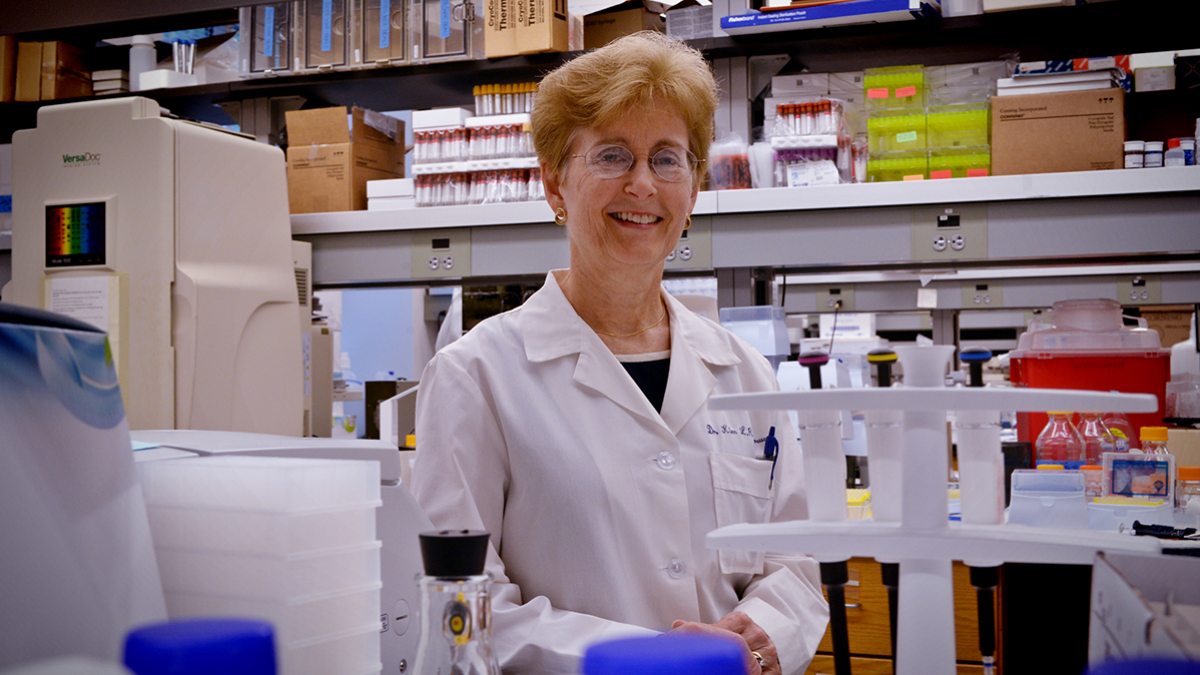Bringing innovation to market
Kim L.R. Brouwer of the Eshelman School of Pharmacy is Carolina’s Inventor of the Year.

Twenty years ago, Kim L. R. Brouwer was a young clinician scientist in Carolina’s School of Pharmacy focused on making a difference in patients’ lives.
She specialized in pharmacokinetics, the branch of pharmacology concerned with the movement of drugs within the body. Brouwer’s particular interest was the science of drug transporters, proteins that play key roles in the absorption, distribution and excretion of many medications — and contribute to the variable response that patients have to the same drug.
In response to this challenge, Brouwer co-invented B-CLEAR® (U.S. Patent No. 6,780,580), which promised the possibility of a reliable method to measure and predict how drugs are handled by the liver to help ensure that they are safe for use beforethey go to clinical trials and the market.
Today, the technology she helped create is exclusively licensed from the University to Qualyst Inc. And Brouwer, as a Qualyst co-founder and former chair of the company’s scientific advisory board, will be honored as Carolina’s Inventor of the Year during the 2019 UNC Celebration of Inventorship.
The Office of Technology Commercialization, which is part of the Vice Chancellor’s Office for Innovation, Entrepreneurship and Economic Development, hosts the event each year to recognize a member of the campus community who has demonstrated a commitment to the University’s culture of encouraging innovation, disseminating knowledge and promoting entrepreneurship.
Brouwer, the William R. Kenan Jr. Distinguished Professor in the Division of Pharmacotherapy and Experimental Therapeutics of the UNC Eshelman School of Pharmacy, now directs an NIH-funded research program focused on the liver. One of the body’s largest and most important organs, the liver is responsible for keeping the body operational, including breaking down and converting substances (including many medications), extracting energy and removing toxins.
Brouwer specialized in the study of liver cells called hepatocytes, which extract substances from the blood, direct many metabolic functions, and also produce and secrete bile. Her work looks at the movement of drugs from the liver to the bile, gallbladder and intestine through a path known as the biliary tract. This critical pathway is responsible for the beneficial and adverse effects of many medications.
Brouwer also serves as the associate dean for research and graduate education in the School of Pharmacy and is a professor in the Curriculum in Toxicology. She has mentored more than 104 undergraduate, professional, graduate and postdoctoral students and published more than 230 research papers, reviews and book chapters.
“We have seen a dramatic shift in the way we educate our graduate professional students today,” Brouwer said. “We encourage them, when they have an idea, to begin to think how they can channel that to the benefit of patient care or science more broadly.
“My generation was not taught to think in that way.”
During a short talk at the 2019 UNC Celebration of Inventorship, Brouwer said she will share the hard lessons she learned as an entrepreneur over the past two decades.
“I’ll try to keep it positive and upbeat, but the reality is it is not always an easy road,” Brouwer said. “We were scientists, not entrepreneurs, and we did not have the business training to do this ourselves. We had to rely heavily on CEOs, and sometimes that takes you in a great direction and sometimes not.” The same is true of investors, she added.
“I’ll talk a little bit about the science, but more about the many business challenges we faced and my perspective on how and what we could have done better,” Brouwer said. “Successfully bringing innovation to market requires time, effort, passion, perseverance and a measure of luck.”




